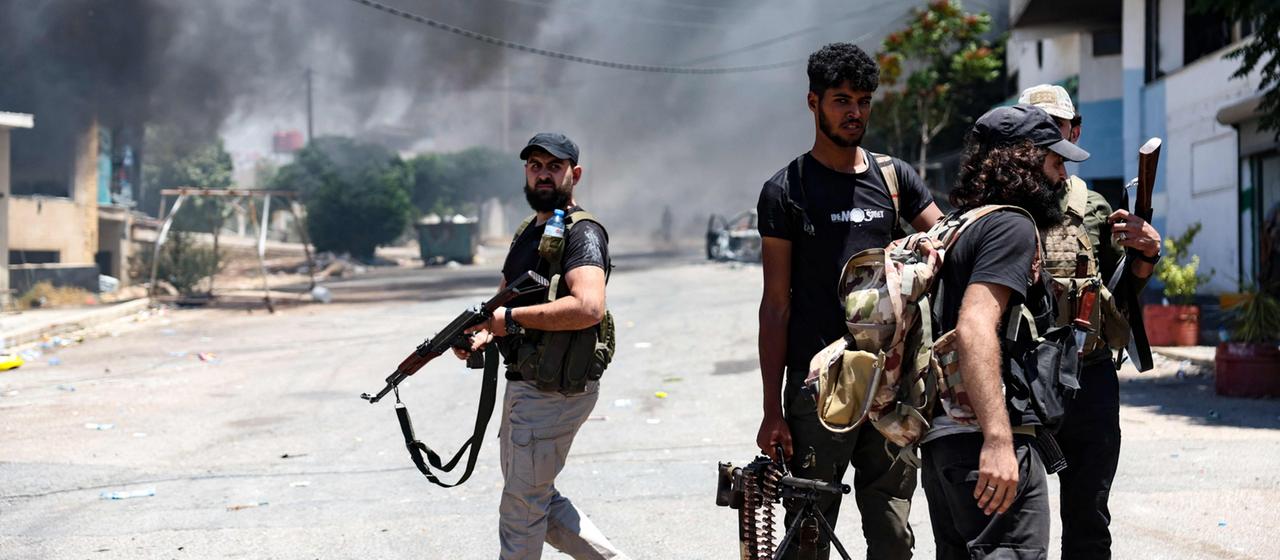
A ceasefire has been in effect again in southern Syria since last night – but apparently not all sides are adhering to it. There are continued reports of fighting from Suwayda province. Nearly 1,000 deaths have now been reported.
Even after the announcement of a ceasefire, fighting continues in southern Syria. According to AFP correspondents, isolated rockets were fired and explosions were heard in the provincial capital of Suwayda. The dpa news agency also reported new fighting in the city.
Images from this morning show black smoke rising over the city. Machine gun fire could be heard, and heavily armed fighters moved through the streets. The Syrian Observatory for Human Rights, which relies on a network of local informants, reported renewed clashes between fighters from the Druze minority and Sunni Bedouins in the west of the city.
Previously, the office of interim President Ahmed al-Sharaa in the capital Damascus announced an"immediate ceasefire" for southern Syria. He called on all parties to the conflict to"fully respect" it. Representatives of both the Druze militias and the Bedouin tribes expressed their support for the ceasefire. However, both sides also stated that they were prepared to resume fighting if the other side did not adhere to the ceasefire. Several previous ceasefire agreements had failed.
Reports of attacks on civilians
In a speech, al-Sharaa asserted that the Syrian state would protect"all minorities and communities in the country." Violations would be punished, and perpetrators would be brought to justice. However, many Druze have lost trust in the Islamist government in Damascus. They accuse it of colluding with armed groups fighting against the Druze. Even after the massacres of Alawites in the spring, al-Sharaa had promised prosecution and investigation, but little has happened since then.
The day before yesterday, Syrian government troops temporarily withdrew from Suwayda province following Israeli airstrikes, but this did not end the fighting between Sunni Bedouin tribes and Druze militias. In addition to heavy fighting, residents continued to report brutal attacks on civilians.
The government has now again deployed security forces to the area around Suwayda. According to reports, the Israeli government has now approved this. Special forces have arrived in Suwayda, Interior Minister Nureddine al-Baba announced on the online service Telegram. The aim of the mission is to"protect civilians and end the chaos."
No Israeli attacks since the ceasefire
Earlier that night, the US Special Envoy for Syria, Thomas Barrack, announced that Israel and Syria had agreed to a ceasefire. Druze, Bedouins, and Sunnis were called upon"to lay down their weapons and, together with other minorities, build a new and united Syrian identity that creates peace and prosperity with their neighbors." At least at the state level between Israel and Syria, the ceasefire has so far held, reports ARD correspondent Ramin Sina.
Israel had repeatedly made it clear that it would not tolerate Syrian soldiers in the border region. In addition to attacks on Syrian government troops in the southwest of the country, Israel even bombed the capital Damascus in the middle of the week.
Hundreds of people killed
The Israeli government justifies its intervention by saying it is protecting the Druze. However, Al-Sharaa accuses Israel of seeking to weaken Syria and therefore supporting separatist groups within Syria's Druze community.
"We must not condemn the entire Druze community for the actions of a small group," he said."Suwayda Province is an integral part of the Syrian state, and the Druze are an essential part of Syria's national fabric. Any attempt to destroy the unity of the Syrian people poses a threat to the country's stability."
The fighting between fighters from the Druze minority and Sunni Bedouins began last Sunday. Hundreds of people have been killed since the fighting began. The Syrian Observatory for Human Rights recently reported that the death toll has now risen to 940. These figures cannot be verified.

